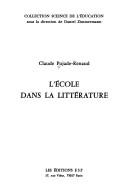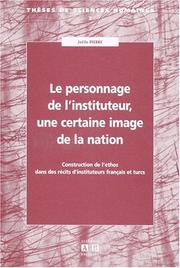| Listing 1 - 10 of 24 | << page >> |
Sort by
|
Book
ISBN: 3261015888 Year: 1975 Publisher: Bern
Abstract | Keywords | Export | Availability | Bookmark
 Loading...
Loading...Choose an application
- Reference Manager
- EndNote
- RefWorks (Direct export to RefWorks)
Thematology --- Mann, Heinrich --- Mann, Thomas --- Teachers in literature.
Book
ISBN: 2859396314 2757422065 Year: 2019 Volume: 12 Publisher: Villeneuve d'Ascq : Presses universitaires du Septentrion,
Abstract | Keywords | Export | Availability | Bookmark
 Loading...
Loading...Choose an application
- Reference Manager
- EndNote
- RefWorks (Direct export to RefWorks)
Au xviiie siècle, “siècle pédagogue” par excellence, le personnage de l’enseignant cherche son entrée dans la littérature. Sa représentation participe de toutes les questions sur l’éducation et l’instruction du prince et des citoyens. Sur le terrain, celui à qui incombe la tâche difficile de l’"Institution de la jeunesse" est en quête de considération. Tandis qu’on songe à le former, une représentation idéale du pédagogue se forge bien avant la naissance de l’Éducation Nationale et le fossé entre les attentes et la réalité se creuse... Qu’y a-t-il de plus épineux que l’image du pédagogue et la réflexion sur les finalités de son action ? Le xviiie siècle met en évidence les implications sociales et politiques des systèmes pédagogiques, qui ne se réduisent pas à la relation maître- élève. Dans cet ouvrage fondé pour l’essentiel sur les textes d’écrivains dits mineurs, premiers lecteurs de ceux dont - comme Rousseau - l’universalité est reconnue depuis long- temps, le lecteur trouvera matière au questionnement inhérent à toute réflexion sur l’éducation.
Education --- Teachers in literature. --- History --- pédagogie --- gouverné --- éducation --- gouvernant --- enseignant --- roi --- peuple
Book
ISBN: 3031340132 3031340124 Year: 2023 Publisher: Cham, Switzerland : Macmillan Palgrave,
Abstract | Keywords | Export | Availability | Bookmark
 Loading...
Loading...Choose an application
- Reference Manager
- EndNote
- RefWorks (Direct export to RefWorks)
Book
ISBN: 9782296000469 2296000460 Year: 2006 Publisher: Paris: L'Harmattan,
Abstract | Keywords | Export | Availability | Bookmark
 Loading...
Loading...Choose an application
- Reference Manager
- EndNote
- RefWorks (Direct export to RefWorks)
Education in literature --- Fiction --- Teachers in literature --- French fiction --- French fiction --- Schools in literature
Book
ISBN: 9788433964649 843396464X Year: 2021 Publisher: Barcelona : Editorial Anagrama,
Abstract | Keywords | Export | Availability | Bookmark
 Loading...
Loading...Choose an application
- Reference Manager
- EndNote
- RefWorks (Direct export to RefWorks)
Reseña del editor: El manual indispensable para impartir clases. Una herramienta para docentes repleta de consejos prácticos. Todos los secretos para ser un buen profesor. ¿Cuál es el secreto de una buena clase? ¿Cómo se consigue captar y retener la atención del alumnado? ¿Cómo puede el profesor lidiar con el estrés? ¿Cómo debe gestionar la relación con los estudiantes? ¿De qué mecanismos dispone para detectar y controlar posibles situaciones conflictivas? Este libro responde a estas y otras muchas preguntas que se hacen los docentes. Pone especial atención en el aprendizaje de la lingüística -materia en la que el autor es especialista-, pero sus consejos van mucho más allá de esta disciplina y son útiles para cualquier profesor o persona que deba impartir seminarios o conferencias. El libro explica, siempre de un modo claro, ágil y didáctico, cómo crear dinámicas de grupo, cómo generar un buen ambiente, cómo animar a trabajar en equipo, cómo hacerse entender, cómo gestionar el tiempo, cómo manejarse con las nuevas tecnologías digitales y saber valorar sus pros y contras. Un manual repleto de pistas y claves, que incorpora abundantes cuadros con información sintetizada y práctica. Una herramienta fundamental para los docentes.
Didáctica. --- Educación --- Instructional systems. --- Maestros. --- Profesores --- Teachers in literature. --- Teachers. --- En la literatura.

ISBN: 2710105896 9782710105893 Year: 1986 Publisher: Paris: ESF,
Abstract | Keywords | Export | Availability | Bookmark
 Loading...
Loading...Choose an application
- Reference Manager
- EndNote
- RefWorks (Direct export to RefWorks)
Education in literature --- Fiction --- Teachers in literature --- French fiction --- French fiction --- Schools in literature

ISBN: 2872096566 9782872096565 Year: 1999 Volume: 3 Publisher: Louvain-la-Neuve Academia-Bruylant
Abstract | Keywords | Export | Availability | Bookmark
 Loading...
Loading...Choose an application
- Reference Manager
- EndNote
- RefWorks (Direct export to RefWorks)
Fertility, Human --- Fécondité humaine --- Africa --- Afrique --- Population policy --- Politique démographique --- Population --- Teachers in literature --- Edgü, Ferit, --- Peyramaure, Michel. --- Teachers in literature. --- Elementary school teachers --- Instituteurs (Enseignement primaire) dans la littérature --- In literature
Book
ISBN: 110852950X 1108438458 1108540325 1108543022 Year: 2018 Publisher: Cambridge : Cambridge University Press,
Abstract | Keywords | Export | Availability | Bookmark
 Loading...
Loading...Choose an application
- Reference Manager
- EndNote
- RefWorks (Direct export to RefWorks)
How is academia portrayed in children's literature? This Element ambitiously surveys fictional professors in texts marketed towards children. Professors are overwhelmingly white and male, tending to be elderly scientists who fall into three stereotypes: the vehicle to explain scientific facts, the baffled genius, and the evil madman. By the late twentieth century, the stereotype of the male, mad, muddlehead, called Professor SomethingDumb, is formed in humorous yet pejorative fashion. This Element provides a publishing history of the role of academics in children's literature, questioning the book culture which promotes the enforcement of stereotypes regarding intellectual expertise in children's media. The Element is also available, with additional material, as Open Access.
Book
ISBN: 0817389911 9780817389918 9780817319168 0817319166 Year: 2016 Publisher: Tuscaloosa
Abstract | Keywords | Export | Availability | Bookmark
 Loading...
Loading...Choose an application
- Reference Manager
- EndNote
- RefWorks (Direct export to RefWorks)
"Investigates a hitherto-unexplored popular fiction genre that spanned the 1830s to the 1880s, that of the "common school" story. These stories, primarily published in periodicals and magazines, and typically told from teachers' perspectives, represent the experiences of students and teachers in common (free, unregulated) schools of the nineteenth century"--
Book
ISBN: 1108266142 1108242103 110827160X 1108416861 9781108271608 9781108242103 1108403360 9781108403368 9781108416863 9781108403368 Year: 2018 Publisher: Cambridge New York
Abstract | Keywords | Export | Availability | Bookmark
 Loading...
Loading...Choose an application
- Reference Manager
- EndNote
- RefWorks (Direct export to RefWorks)
Anglo-Saxons valued education yet understood how precarious it could be, alternately bolstered and undermined by fear, desire, and memory. They praised their teachers in official writing, but composed and translated scenes of instruction that revealed the emotional and cognitive complexity of learning. Irina Dumitrescu explores how early medieval writers used fictional representations of education to explore the relationship between teacher and student. These texts hint at the challenges of teaching and learning: curiosity, pride, forgetfulness, inattention, and despair. Still, these difficulties are understood to be part of the dynamic process of pedagogy, not simply a sign of its failure. The book demonstrates the enduring concern of Anglo-Saxon authors with learning throughout Old English and Latin poems, hagiographies, histories, and schoolbooks.
English literature --- Education in literature. --- Teachers in literature. --- Civilization, Anglo-Saxon, in literature. --- Schools in literature --- History and criticism. --- Great Britain --- History
| Listing 1 - 10 of 24 | << page >> |
Sort by
|

 Search
Search Feedback
Feedback About UniCat
About UniCat  Help
Help News
News